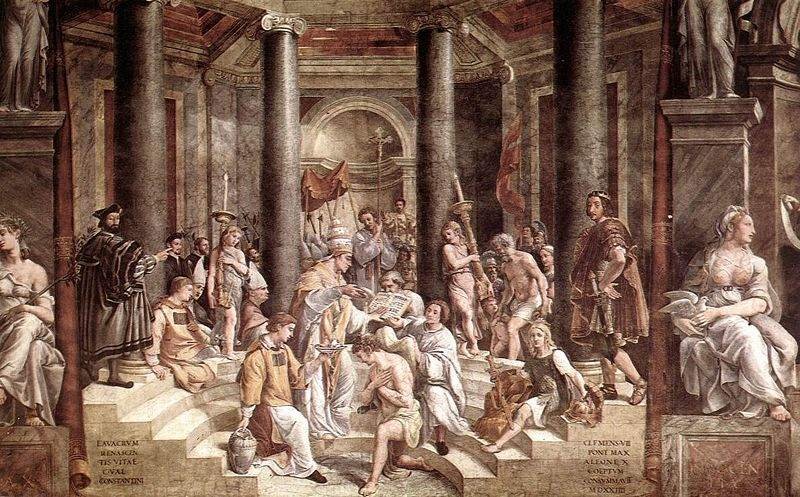
Here’s something I just transcribed for the sake of linking to it in a discussion. The Catholic Church has consistently taught that God in His mercy can save those who desired to be baptized but were unable, or who would have desired to be baptized had they been aware of its necessity (CCC 1257–1261). This holds particularly true for catechumens, whose explicit desire for Baptism, repentance from sins, and growth in charity and faith, have already joined them to the Church (CCC 1247–1249, 1259). The following is an excerpt from St. Ambrose of Milan’s funeral oration on the death of the emperor Valentinian II (371–392), who fell victim to the common practice of deferring Baptism until late in life or even to one’s deathbed. At the time of his death, he had requested for Ambrose himself to baptize him — but before the bishop could arrive or the emperor could travel to Italy, Valentinian was murdered. In Ambrose’s consolation, he declares the hope of Valentinian’s salvation despite his failure to be baptized, and God’s mercy upon him because of his desire for the Sacrament. This demonstrates both the Church’s firm belief in baptismal regeneration and its necessity, and in God’s mercy upon those who failed to be baptized.

(51) But I hear that you grieve because he did not receive the sacrament of baptism. Tell me: What else is in your power other than the desire, the request?* But he even had this desire for a long time, that, when he should come into Italy, he would be initiated, and recently he signified his desire to be baptized by me, and for this reason above all others he thought that I ought to be summoned. Has he not, then, the grace which he desired; has he not the grace which he requested? And because he asked, he received, and therefore it is said: ‘By whatsoever death the just man shall be overtaken, his soul shall be at rest’ (Wisdom 4:7).
(52) Grant, therefore, O holy Father, to Thy servant the gift which Moses received, because he saw in spirit; the gift which David merited, because he knew from revelation. Grant, I pray, to Thy servant Valentinian the gift which he longed for, the gift which he requested while in health, vigor, and security. If, stricken with sickness, he had deferred it, he would not be entirely without Thy mercy who has been cheated by the swiftness of time, not by his own wish. Grant, therefore, to Thy servant the gift of Thy grace which he never rejected … He who had Thy Spirit, how has he not received Thy grace?
(53) Or if the fact disturbs you that the mysteries have not been solemnly celebrated, then you should realize that not even martyrs are crowned if they are catechumens, for they are not crowned if they are not initiated. But if they are washed in their own blood, his piety and his desire have washed him, also.

(54) Do not, I beseech, O Lord, separate him from his brother, do not break the yoke of this pious relationship. Now Gratian, already Thine, and vindicated by Thy judgment, is in further peril, if he be separated from his brother, if he deserve not to be with him through whom he has deserved to be vindicated. … (55) Your father also is present [Valentinian I], who under Julian spurned imperial service and the honors of the tribunate out of his love for the faith. Give to the father his son, to the brother his brother, both of whom he imitated, the one by his faith, the other equally by his devotion and piety …
(56) Offer the holy mysteries with your hands, with devoted love let us ask for his repose. Offer the heavenly sacraments, let us accompany the soul of our son with our oblations. ‘Lift up with me, O people, your hands to the holy place’ (Psalm 133(134):2), so that at least through this service we may repay him for his deserts. Not with flowers shall I sprinkle his grave, but I shall bedew his spirit with the odor of Christ. Let others scatter lilies in basketfuls. Christ is our lily, and with this lily I shall bless his remains, with this I shall recommend for his favor.
Source: Roy J. Deferrari, translator. “Consolation on the Death of Emperor Valerian.” Funeral Orations by Saint Gregory Nazianzen and Saint Ambrose. The Fathers of the Church: A New Translation. New York: Fathers of the Church, 1953. 261–299, at 287–289. Retrieved from the Internet Archive, 23 September 2013.
* Pardon my interruption: But I wanted to point this out. Baptism is not a human “work” as Protestants charge; it is a work of grace by the hands of Christ (cf. Colossians 2:11), and, as Ambrose says, our desire for it is the only thing within our own power (cf. “an appeal (or request) to God for a clean conscience,” 1 Peter 3:21). Does this sound like “works’ righteousness”? —JTR
Leave a comment